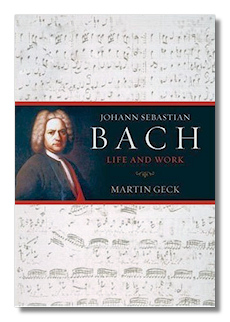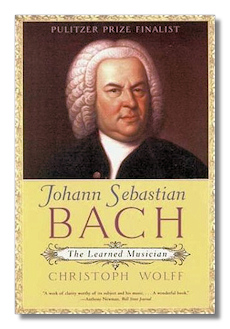
The Internet's Premier Classical Music Source
Related Links
-
Introduction
Acoustics
Ballet
Biographies
Chamber Music
Composers & Composition
Conducting
Criticism & Commentary
Discographies & CD Guides
Fiction
History
Humor
Illustrations & Photos
Instrumental
Lieder
Music Appreciation
Music Education
Music Industry
Music and the Mind
Opera
Orchestration
Reference Works
Scores
Thematic Indices
Theory & Analysis
Vocal Technique
Search Amazon
Recommended Links
Site News
 Book Review
Book Review
Johann Sebastian Bach

Life and Work
Martin Geck
Forward by Kurt Mazur
Translated from the German by John Hargraves
Harcourt (2006) 738 pp
ISBN-10: 0151006482
ISBN-13: 978-0151006489


The Learned Musician
Christoph Wolff
New York, London: W.W. Norton (2000, 2001) 599 pp
ISBN-10: 0393322564
ISBN-13: 978-0393322569
These are both learned works, by distinguished German scholars. Wolff's is a biography only, though sometimes he cannot help himself and writes about the music as music. He intends to complete a second volume, strictly about Bach's music. Geck's book is divided into a biographical half (pp. 3-273) and a discussion of the music, genre by genre.
If you take the time to read them both you can learn pretty much everything that is currently known about Bach's life. If your patience is more limited than that, I would recommend the Wolff over the Geck, in spite of Mazur's endorsement. Wolff's was a Pulitzer Prize finalist, has much more information about Bach's pre-Leipzig travels and career; I think he makes Bach come to life somewhat better than Geck's, which is written in more of an academic style. Geck gives arguments from data in a manner more of interest to fellow scholars than the generally educated reader, and he perhaps assumes more knowledge on the part of the reader than does Wolff. Geck's discussion of Bach's musical style will surely send the reader unfamiliar with baroque style to a musical dictionaries. He even mentions, but does not define, one term he considers essential to the modern musicologist but which appeared only once in theoretical musical writing by Bach's time; he checked!
Wolff begins with an account of an insult to Bach's status as a complete musician by one of his contemporaries. Geck prefaces his account of Bach's life with an account of earlier works about Bach: Forkel, Spitta, Schweitzer. Neither displays much of a sense of the dramatic. Probably the gravest insult to this great genius in his lifetime was his being thrown in jail and given a dishonorable discharge for insisting on leaving his employment in Weimar in 1717. Both biographers mention this almost in passing. (I was reminded of the incident in Mozart's life when he was literally kicked out of the palace of his employer the Archbishop of Salzburg.) Neither bothers to explain why this could have happened. Just what were the conditions of employment in the 18th Century for a musician? This gives new meaning to the polite signoff, "Your obedient servant," standard in correspondence of the period. Bach had conflict with employers even at the height of his career in Leipzig, incidentally. Another part of Bach's life that more popular biographies would probably give a chapter to would be the musical activities in Zimmermann's coffeehouse in Leipzig, the venue where several of several of Bach's concertos were performed.
Both biographers relate what is known of Bach's family, including the successes of some of his sons, and the life course of the one who could be called a musical dropout. It is Wolff who gives detailed accounts of Bach's career moves, salary negotiations and compensation specifics over the years which surely were related to the needs of supporting his growing family. Quite a lot is known about that. The musical expectations of his various employers, municipal or noble, are well indicated in both accounts and, since this directly accounts for Bach's compositional output, that is as it should be. Much of his keyboard composition, though, was related to Bach's activities as private teacher. Group teaching in the Leipzig Thomas School was not altogether to Bach's liking; he hired a substitute for one of his courses. Geck quotes an official, following Bach's death, who said that Bach was no doubt a great musician but no teacher. He did devote himself to some very talented private students, however. Bach himself had an education preparatory to university studies but he was unable to attend university for financial reasons; nevertheless he became enormously learned in music through his own efforts, including both theoretical and practical matters, very much including the details of organ construction.
Wolff appears to be much more interested in Bach's cantatas and other vocal music than in his secular instrumental music. He gives exhaustive accounts of the various cantata cycles, what was composed when and what survives or not of each. Geck gives a fuller account of the composition of the keyboard works. I don't know what Wolff plans for his next volume, but Geck gives about equal space to the vocal and instrumental music in the latter part of his book.
Copyright © 2008 by R. James Tobin


















